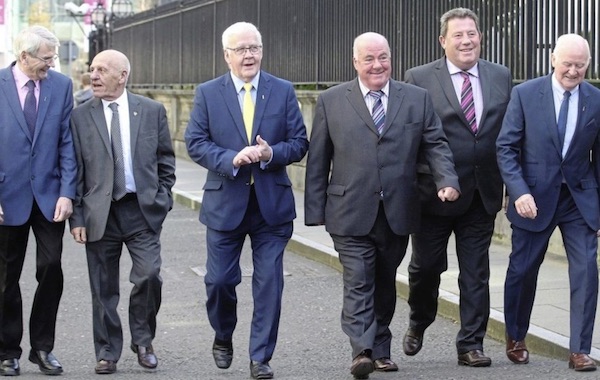
The ‘Hooded Men’ have vowed that their campaign for justice is not over after the European Court of Human Rights rejected an appeal against the court’s ruling that they were not tortured.
The techniques used by the British military against the men in the 1970s included being hooded, made to stand in stress positions, forced to listen to loud static noise and being deprived of sleep, food and water.
In some cases the men, including Mr Shannon, were also thrown from helicopters they were told were hundreds of feet in the air.
In 1978 the ECHR held their treatment at the Ballykelly British military camp in County Derry was inhuman and degrading, but fell short of torture.
One of those who suffered, West Belfast man Liam Shannon, said not reversing the 1978 judgment had resulted in the use of similar techniques elsewhere.
He said it was “an awful mistake”.
“In countries all over the world people were trailed out and tortured and murdered, and they did it in the name of the judgment between Ireland and the United Kingdom,” he said.
“If that judgment had have been rectified they wouldn’t have been able to do it.”
Mr Shannon said the surviving Hooded Men continue to feel the impact of their treatment including flashbacks and waking up in cold sweats.
“If there is such a place as hell, I was there for seven days,” he said.
“Had this been carried out by a bunch of squaddies, or a bunch of rogue RUC [police] men, you probably could have accepted that but this was cleared at the highest echelons of government,” he said.
“It wasn’t just done on a whim, it was well thought out, it was well contrived and they knew exactly what they were doing.”
The 26 County Foreign Affairs Minister Simon Coveney, who brought the case to Europe, described the outcome as “deeply disappointing”.
He said: “It is important to say that nothing in the panel decision today or the Court’s ruling on March 20 last altered the Court’s original 1978 judgment that the victims in the case suffered inhuman and degrading treatment, in breach of Article 3 of the Convention.
“The men have campaigned with dignity and determination for many years for the appalling suffering they endured in 1974 to be confirmed as torture. The Government shares that view, which is why it sought the revision of the judgment in 2014.”
Amnesty International described the decision as a “bitter blow” for the men and their families.
“When Amnesty visited the detainees in 1971, we found clear evidence of torture. Our assessment has not changed in the years since and today’s decision does not change this.”
Sinn Fein’s Niall O Donnghaile said the men would continue to have support in getting to the truth.
“The people of Ireland, countless humanitarian and human rights organisations the world over all know well what these men endured amounted to torture,” he said.
Darragh Mackin, a lawyer for a number of the Hooded Men, promised that the campaign would continue.
“This case was always highly supercharged given the potential ramifications of any decision to overturn the original judgment,” he said.
“These techniques were and are torture. The Belfast High Court has said it, the London Supreme Court has said it. It is disheartening that the European Court has instead used procedural gymnastics to avoid saying the same.”
He said the disappointing decision was “no surprise” and it was hard not to think the court was “was hiding behind nuanced procedure to shield itself from the thorny issue at the heart of this case.”
For too long the original ruling has been used by international states as a “battering ram against human rights protections, when utilising torturous techniques,” he said.
He said the campaign was not over and they awaited an Belfast court judgment in which the PSNI police chief appealed a decision that requires the identification and prosecution of those individuals who perpetrated and authorised the torture.
![[Irish Republican News]](https://republican-news.org/graphics/title_gifs/rn.gif)
![[Irish Republican News]](https://republican-news.org/graphics/title_gifs/harp.gif)

